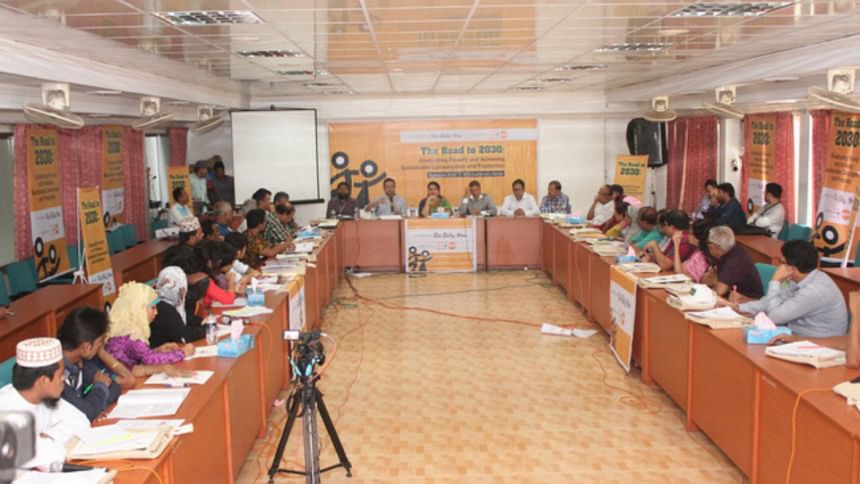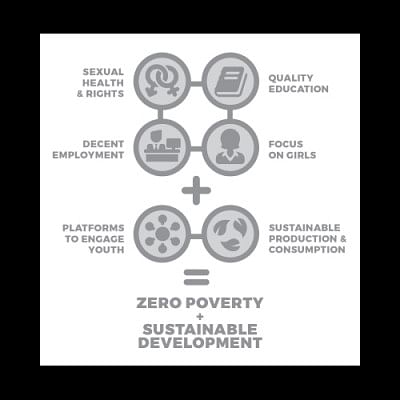The Road to 2030: Eradicating Poverty and Achieving Sustainable Consumption and Production

An interactive and lively discussion looked into the issue of youth's role in ensuring poverty eradication and achieving sustainable
development in Bangladesh through sustainable consumption and production. Politicians, government officials, teachers, researchers,civil society members, representatives from local and international NGOs, journalists and young people, particularly teenage girls, attended the roundtable organised by UNFPA and The Daily Star in Barisal. They discussed the importance of enacting policies that promote young people's development and human rights. They stressed the need to measure progress across the Sustainable Development Goals that relate to adolescents and youth. There was a strong consensus on the need to prioritise investment in young people to enable these changes.

Bangladesh is now enjoying a window of opportunity in terms of demography, which can be turned into a demographic dividend - a boost in economic productivity due to growing numbers of people in the workforce relative to the number of dependents.Bangladesh can harness the power of the young and benefit from a demographic dividend for the next 20-25 years. To realise this population dividend, the country needs to invest more in youth, particularly in their health and education. If such investments can be coupled with sustainable production and consumption, the concept of population dividend will become a reality. The 2030 Agenda for Sustainable Development also calls for empowering young people through investing more in adolescents and youth towards achieving sustainable goals.
To empower young people means giving them the tools to become even more influential, productive actors in their societies. In this regard, providing quality education and developing skills of young people are key, according to the participants. They also focused on the need for imparting comprehensive sex education and making comprehensive health care including sexual and reproductive health information and services available to young people. Repositioning Family Planning and Comprehensive Sexuality and Reproductive Education for the young will also galvanize efforts to end poverty. Evidence has shown that when families have fewer children, they invest more in their education, increasing skills and thus human capital. Family members are also able to save more for their retirement and thus able to invest more. Moreover, if girls receive education and are empowered to seek employment, the workforce grows, leading to a boost in the economy. An adolescent girl who is 10 years old today will be an adult of 24 in 2030, the target year for achieving the Sustainable Development Goals. If we can ensure her wellbeing throughout adolescence and youth, it will lead to a brighter future for herself, her community and the world.
The participants also urged that we must end all forms of discrimination faced by young people, particularly adolescent girls, such as forced marriage and child marriage and sexual violence, which can result in unwanted pregnancies, unsafe abortions and HIV infections, and risk derailing their future.
While it is important to create a safe and enabling environment for our adolescents and youth, we also need to think about their future. The current trend of exploitation of natural resources will not leave anything for our future generations. Current growth and development plans therefore need to balance the needs of the present and future generations through sustainable consumption and production. The SDG Goal 12 stipulates that sustainable consumption and production is about promoting resource and energy efficiency, sustainable infrastructure, and providing access to basic services, green and decent jobs and a better quality of life for all. Its implementation helps to achieve overall development plans, reduce future economic, environmental and social costs, strengthen economic competitiveness and reduce poverty.
The young participants shared that young people lack access to vital resources, and are disproportionately represented amongst the disadvantaged groups. Many young people continue to face barriers to making sustainable choices. These barriers include lack of access to decent work, the high prices of goods and services and lack of information about what options are available. Decent work is the best way young people can improve their living conditions and strengthen the economies. It also makes them conscious consumers, savers and producers.
The young attendants urged that young people should not be looked at as a problem rather as a great potential of innovative solutions. In Bangladesh, young people are already driving innovations in science and technology, making conscious choices that are drastically influencing patterns of consumption and production. When they can get information, technology, financing, mentorship and platforms for collaboration, young innovators are able to turn their ideas into transformative solutions.
All the participants agreed on the need for a fundamental shift in allocating resources and investing more in youth. They pressed on the need for young people to be involved more in policymaking and implementation because they have the most to gain if we succeed in achieving sustainable development, and will have the most to lose if we fail. The programme ended with the hope that the draft national youth policy, which is in the process of being finalized, will reflect these recommendations and prioritize youth in all the programmes targeted to eradicate poverty and achieve sustainable goals.
RECOMMENDATIONS
* Measure progress across the Sustainable Development Goals that relate to adolescents and youth.
* Invest more in youth, particularly in their health and education.
* End all forms of discrimination faced by young people, particularly adolescent girls.
* Balance the needs of the present and future generations through sustainable consumption and production.
* Involve young people in policy making and implementation.

 For all latest news, follow The Daily Star's Google News channel.
For all latest news, follow The Daily Star's Google News channel. 



Comments